formerly eScholarship Editions


|
|
|
|
Your request for similar items found 20 book(s). | Modify Search | Displaying 1 - 20 of 20 book(s) | |
| 1. | 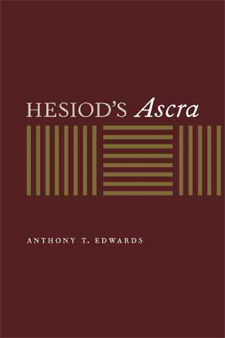 | Title: Hesiod's Ascra Author: Edwards, Anthony T Published: University of California Press, 2004 Subjects: Classics | Classical History | Classical Politics | Classical Literature and Language | Economics and Business Publisher's Description: In Works and Days, one of the two long poems that have come down to us from Hesiod, the poet writes of farming, morality, and what seems to be a very nasty quarrel with his brother Perses over their inheritance. In this book, Anthony T. Edwards extracts from the poem a picture of the social structure of Ascra, the hamlet in northern Greece where Hesiod lived, most likely during the seventh century b.c.e. Drawing on the evidence of trade, food storage, reciprocity, and the agricultural regime as Hesiod describes them in Works and Days, Edwards reveals Ascra as an autonomous village, outside the control of a polis, less stratified and integrated internally than what we observe even in Homer. In light of this reading, theconflict between Hesiod and Perses emerges as a dispute about the inviolability of the community's external boundary and the degree of interobligation among those within the village. Hesiod's Ascra directly counters the accepted view of Works and Days, which has Hesiod describing a peasant society subordinated to the economic and political control of an outside elite. Through his deft analysis, Edwards suggests a new understanding of both Works and Days and the social and economic organization of Hesiod's time and place. [brief] Similar Items |
| 2. | 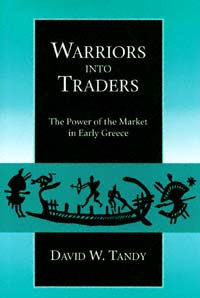 | Title: Warriors into traders: the power of the market in early Greece Author: Tandy, David W Published: University of California Press, 1997 Subjects: Classics | Ancient History | Classical History | Economics and Business | Anthropology | Politics Publisher's Description: The eighth century dawned on a Greek world that had remained substantially unchanged during the centuries of stagnation known as the Dark Age. This book is a study of the economic and cultural upheaval that shook mainland Greece and the Aegean area in the eighth century, and the role that poetry played in this upheaval. Using tools from political and economic anthropology, David Tandy argues that between about 800 and 700 B.C., a great transformation of dominant economic institutions took place involving wrenching adjustments in the way status and wealth were distributed within the Greek communities.Tandy explores the economic organization of preindustrial societies, both ancient and contemporary, to shed light on the Greek experience. He argues that the sudden shift in Greek economic formations led to new social behaviors and to new social structures such as the polis , itself a by-product of economic change. Unraveling the dialectic between the material record and epic poetry, Tandy shows that the epic tradition mirrored these new social behaviors and that it portrayed the stresses that economic change brought to the ancient Aegean world.Tandy brings in comparative evidence from other small-scale communities beset by changes, spotlighting the specific plight of one community, Ascra in Boeotia, on whose behalf Hesiod sang his Works and Days . The result is a lively, moving account of a human dilemma that, many centuries later, is all too familiar. [brief] Similar Items |
| 3. | 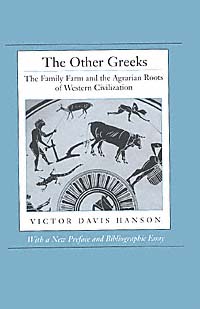 | Title: The other Greeks: the family farm and the agrarian roots of western civilization Author: Hanson, Victor Davis Published: University of California Press, 1999 Subjects: Classics | European History Publisher's Description: For generations, scholars have focused on the rise of the Greek city-state and its brilliant cosmopolitan culture as the ultimate source of the Western tradition in literature, philosophy, and politics. This passionate book leads us outside the city walls to the countryside, where the vast majority of the Greek citizenry lived, to find the true source of the cultural wealth of Greek civilization. Victor Hanson shows that the real "Greek revolution" was not merely the rise of a free and democratic urban culture, but rather the historic innovation of the independent family farm.The farmers, vinegrowers, and herdsmen of ancient Greece are "the other Greeks," who formed the backbone of Hellenic civilization. It was these tough-minded, practical, and fiercely independent agrarians, Hanson contends, who gave Greek culture its distinctive emphasis on private property, constitutional government, contractual agreements, infantry warfare, and individual rights. Hanson's reconstruction of ancient Greek farm life, informed by hands-on knowledge of the subject (he is a fifth-generation California vine- and fruit-grower) is fresh, comprehensive, and absorbing. His detailed chronicle of the rise and tragic fall of the Greek city-state also helps us to grasp the implications of what may be the single most significant trend in American life today - the imminent extinction of the family farm. [brief] Similar Items |
| 4. | 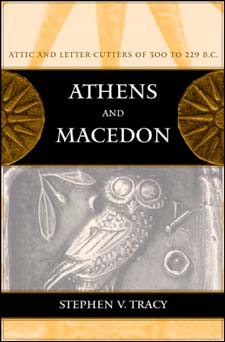 | Title: Athens and Macedon: Attic letter-cutters of 300 to 229 B.C Author: Tracy, Stephen V 1941- Published: University of California Press, 2003 Subjects: Classics | Classical History | Archaeology | Ancient History Publisher's Description: Little of the historiography of third-century Athens survives, and much of what we know - or might know - about the period has come down to us in inscriptions carved by Attic stonemasons of the time. In this book Stephen Tracy, the world's preeminent expert in this area, provides new insight into an . . . [more] Similar Items |
| 5. | 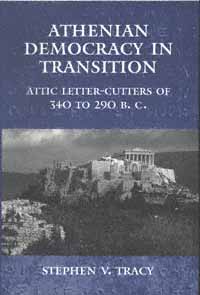 | Title: Athenian democracy in transition: Attic letter-cutters of 340 to 290 B.C Author: Tracy, Stephen V 1941- Published: University of California Press, 1995 Subjects: Classics | Ancient History | Archaeology Publisher's Description: Furthering his masterful new approach to classifying and interpreting epigraphical data presented in Attic Letter-Cutters of 229 to 86 B.C. , Stephen V. Tracy has produced a masterful study of the inscriptions from the time of King Philip of Macedon, Alexander the Great, Demosthenes, and Demetrios. Detailed study of the hands in this largest group of primary documents has enabled him to offer a number of new insights, such as reassessing the career of Demetrios of Phaleron and taking issue with the commonly accepted view that Athenian democracy ended in 322 B.C. with the defeat by the Macedonians at Krannon.Tracy pieces together stone documents and shows that the "handwriting" of individual stonecutters can be identified by the way particular letters are cut into the stone. He offers new readings, redatings, joins and associations, as well as initial publication of some fragments from the excavations in the Athenian agora. [brief] Similar Items |
| 6. | 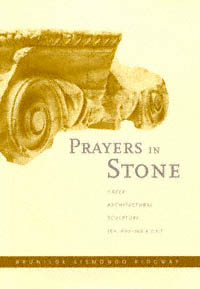 | Title: Prayers in stone: Greek architectural sculpture ca. 600-100 B.C.E Author: Ridgway, Brunilde Sismondo 1929- Published: University of California Press, 1999 Subjects: Classics | Art | Art and Architecture | Art History Publisher's Description: The meaning of architectural sculpture is essential to our understanding of ancient Greek culture. The embellishment of buildings was common for the ancient Greeks, and often provocative. Some ornamental sculpture was placed where, when the building was finished, no mortal eye could view it. And unlike much architectural ornamentation of other cultures, Greek sculpture was often integral to the building, not just as decoration, and could not be removed without affecting the integrity of the building structure. This book is the first comprehensive treatment of the significance of Greek architectural sculpture. Brunilde Sismondo Ridgway, a world-class authority on ancient Greek sculpture, provides a highly informative tour of many dimensions of Greek public buildings - especially temples, tombs, and treasuries - in a text that is at once lucid, accessible, and authoritative.Ridgway's pragmatism and common sense steer us tactfully and clearly through thickets of uncertainty and scholarly disagreement. She refers to a huge number of monuments, and documents her discussions with copious and up-to-date bibliographies. This book is sure to be acknowledged at once as the standard treatment of its important topic. [brief] Similar Items |
| 7. | 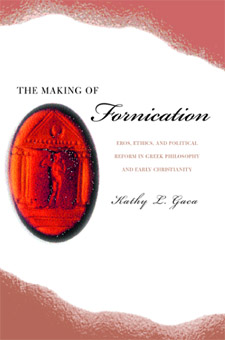 | Title: The making of fornication: eros, ethics, and political reform in Greek philosophy and early Christianity Author: Gaca, Kathy L Published: University of California Press, 2003 Subjects: Classics | Classical Philosophy | Classical Religions | Classical Politics | Christianity | Ethics | Social and Political Thought | Ancient History | Intellectual History Publisher's Description: This provocative work provides a radical reassessment of the emergence and nature of Christian sexual morality, the dominant moral paradigm in Western society since late antiquity. While many scholars, including Michel Foucault, have found the basis of early Christian sexual restrictions in Greek ethics and political philosophy, Kathy L. Gaca demonstrates on compelling new grounds that it is misguided to regard Greek ethics and political theory - with their proposed reforms of eroticism, the family, and civic order - as the foundation of Christian sexual austerity. Rather, in this thoroughly informed and wide-ranging study, Gaca shows that early Christian goals to eradicate fornication were derived from the sexual rules and poetic norms of the Septuagint, or Greek Bible, and that early Christian writers adapted these rules and norms in ways that reveal fascinating insights into the distinctive and largely non-philosophical character of Christian sexual morality. Writing with an authoritative command of both Greek philosophy and early Christian writings, Gaca investigates Plato, the Stoics, the Pythagoreans, Philo of Alexandria, the apostle Paul, and the patristic Christians Clement of Alexandria, Tatian, and Epiphanes, freshly elucidating their ideas on sexual reform with precision, depth, and originality. Early Christian writers, she demonstrates, transformed all that they borrowed from Greek ethics and political philosophy to launch innovative programs against fornication that were inimical to Greek cultural mores, popular and philosophical alike. The Septuagint's mandate to worship the Lord alone among all gods led to a Christian program to revolutionize Gentile sexual practices, only for early Christians to find this virtually impossible to carry out without going to extremes of sexual renunciation. Knowledgeable and wide-ranging, this work of intellectual history and ethics cogently demonstrates why early Christian sexual restrictions took such repressive ascetic forms, and casts sobering light on what Christian sexual morality has meant for religious pluralism in Western culture, especially among women as its bearers. [brief] Similar Items |
| 8. | 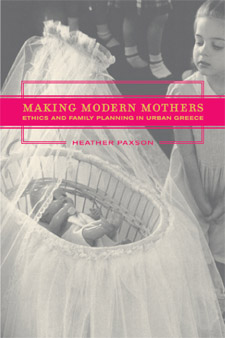 | Title: Making modern mothers: ethics and family planning in urban Greece Author: Paxson, Heather 1968- Published: University of California Press, 2004 Subjects: Gender Studies | Sociology | Anthropology | Anthropology Publisher's Description: In Greece, women speak of mothering as "within the nature" of a woman. But this durable association of motherhood with femininity exists in tension with the highest incidence of abortion and one of the lowest fertility rates in Europe. In this setting, how do women think of themselves as proper individuals, mothers, and Greek citizens? In this anthropological study of reproductive politics and ethics in Athens, Greece, Heather Paxson tracks the effects of increasing consumerism and imported biomedical family planning methods, showing how women's "nature" is being transformed to meet crosscutting claims of the contemporary world. Locating profound ambivalence in people's ethical evaluations of gender and fertility control, Paxson offers a far-reaching analysis of conflicting assumptions about what it takes to be a good mother and a good woman in modern Greece, where assertions of cultural tradition unfold against a backdrop of European Union integration, economic struggle, and national demographic anxiety over a falling birth rate. [brief] Similar Items |
| 9. | 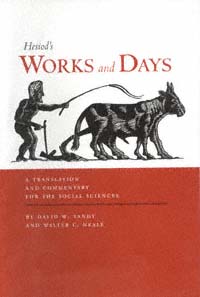 | Title: Hesiod's Works and days Author: Hesiod Published: University of California Press, 1997 Subjects: Economics and Business | Classics | Sociology | Ancient History Publisher's Description: This new, annotated translation of Hesiod's Works and Days is a collaboration between David W. Tandy, a classicist, and Walter Neale, an economist and economic historian. Hesiod was an ancient Greek poet whose Works and Days discusses agricultural practices and society in general. Classicists and ancient historians have turned to Works and Days for its insights on Greek mythology and religion. The poem also sheds light on economic history and ancient agriculture, and is a good resource for social scientists interested in these areas. This translation emphasizes the activities and problems of a practicing agriculturist as well as the larger, changing political and economic institutions of the early archaic period.The authors provide a clear, accurate translation along with notes aimed at a broad audience. The introductory essay discusses the changing economic, political and trading world of the eighth and seventh centuries B.C.E., while the notes present the range and possible meanings of important Greek terms and references in the poem and highlight areas of ambiguity in our understanding of Works and Days . [brief] Similar Items |
| 10. | 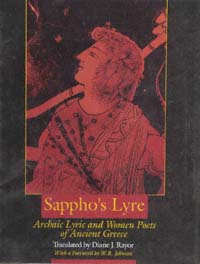 | Title: Sappho's lyre: archaic lyric and women poets of ancient Greece Author: Rayor, Diane J Published: University of California Press, 1991 Subjects: Classics | Classical Literature and Language | Literature in Translation | Poetry Publisher's Description: Sappho sang her poetry to the accompaniment of the lyre on the Greek island of Lesbos over 2500 years ago. Throughout the Greek world, her contemporaries composed lyric poetry full of passion, and in the centuries that followed the golden age of archaic lyric, new forms of poetry emerged. In this unique anthology, today's reader can enjoy the works of seventeen poets, including a selection of archaic lyric and the complete surviving works of the ancient Greek women poets - the latter appearing together in one volume for the first time. Sappho's Lyre is a combination of diligent research and poetic artistry. The translations are based on the most recent discoveries of papyri (including "new" Archilochos and Stesichoros) and the latest editions and scholarship. The introduction and notes provide historical and literary contexts that make this ancient poetry more accessible to modern readers.Although this book is primarily aimed at the reader who does not know Greek, it would be a splendid supplement to a Greek language course. It will also have wide appeal for readers of' ancient literature, women's studies, mythology, and lovers of poetry. [brief] Similar Items |
| 11. | 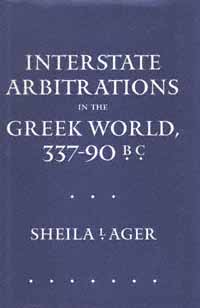 | Title: Interstate arbitrations in the Greek world, 337-90 B.C. Author: Ager, Sheila L 1956- Published: University of California Press, 1997 Subjects: Classics | Classical History | Ancient History Publisher's Description: A great deal of information has come to light over the past several decades about the role of arbitration between the Greek states. Arbitration and mediation were, in fact, central institutions in Hellenistic public life. In this comprehensive study, Sheila Ager brings together the scattered body of literary and epigraphical sources on arbitration, together with up-to-date bibliographic references, and commentary.The sources collected here range widely; Ager presents an exhaustive record of documents ranging from the settlement of a minor territorial squabble between two tiny city-states to the resolution of major conflicts separating the great powers of the day. In addition, Ager's introduction sets the documents in historical context and outlines distinctions among categories of arbitration. The work also includes indices to literary passages, inscriptions, persons, places, subjects, and Greek and Latin terms in the documents. This collection of many previously inaccessible texts will become a primary resource for any scholar or student working in the field of Hellenistic history. [brief] Similar Items |
| 12. | 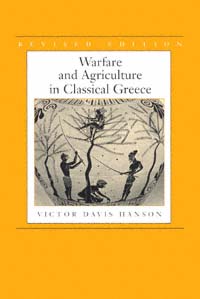 | Title: Warfare and agriculture in classical Greece Author: Hanson, Victor Davis Published: University of California Press, 1998 Subjects: Classics | Classical History | Military History | Ancient History | Classical Politics | Agriculture Publisher's Description: The ancient Greeks were for the most part a rural, not an urban, society. And for much of the Classical period, war was more common than peace. Almost all accounts of ancient history assume that farming and fighting were critical events in the lives of the citizenry. Yet never before have we had a comprehensive modern study of the relationship between agriculture and warfare in the Greek world. In this completely revised edition of Warfare and Agriculture in Classical Greece , Victor Davis Hanson provides a systematic review of Greek agriculture and warfare and describes the relationship between these two important aspects of life in ancient communities. With careful attention to agronomic as well as military details, this well-written, thoroughly researched study reveals the remarkable resilience of those farmland communities.In the past, scholars have assumed that the agricultural infrastructure of ancient society was often ruined by attack, as, for example, Athens was relegated to poverty in the aftermath of the Persian and later Peloponnesian invasions. Hanson's study shows, however, that in reality attacks on agriculture rarely resulted in famines or permanent agrarian depression. Trees and vines are hard to destroy, and grainfields are only briefly vulnerable to torching. In addition, ancient armies were rather inefficient systematic ravagers and instead used other tactics, such as occupying their enemies' farms to incite infantry battle. Warfare and Agriculture in Classical Greece suggests that for all ancient societies, rural depression and desolation came about from more subtle phenomena - taxes, changes in political and social structure, and new cultural values - rather than from destructive warfare. [brief] Similar Items |
| 13. |  | Title: The returns of Odysseus: colonization and ethnicity Author: Malkin, Irad Published: University of California Press, 1998 Subjects: Classics | Classical History | Anthropology | Classical Literature and Language Publisher's Description: This remarkably rich and multifaceted study of early Greek exploration makes an original contribution to current discussions of the encounters between Greeks and non-Greeks. Focusing in particular on myths about Odysseus and other heroes who visited foreign lands on their mythical voyages homeward after the Trojan War, Irad Malkin shows how these stories functioned to mediate encounters and conceptualize ethnicity and identity during the Archaic and Classical periods. Synthesizing a wide range of archaeological, mythological, and literary sources, this exceptionally learned book strengthens our understanding of early Greek exploration and city-founding along the coasts of the Western Mediterranean, reconceptualizes the role of myth in ancient societies, and revitalizes our understanding of ethnicity in antiquity.Malkin shows how the figure of Odysseus became a proto-colonial hero whose influence transcended the Greek-speaking world. The return-myths constituted a generative mythology, giving rise to oral poems, stories, iconographic imagery, rituals, historiographical interpretation, and the articulation of ethnic identities. Reassessing the role of Homer and alternative return-myths, the book argues for the active historical function of myth and collective representations and traces their changing roles through a spectrum of colonial perceptions - from the proto-colonial, through justifications of expansion and annexation, and up to decolonization. [brief] Similar Items |
| 14. | 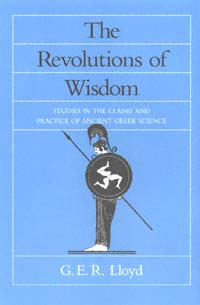 | Title: The revolutions of wisdom: studies in the claims and practice of ancient Greek science Author: Lloyd, G. E. R. (Geoffrey Ernest Richard) 1933- Published: University of California Press, 1989 Subjects: Classics | Classical History Publisher's Description: G.E.R. Lloyd's wide-ranging and historical study of the development of Greek science is a valuable contribution to current debates in the philosophy of language, on the analysis of scientific revolutions, and the rationality of science. Similar Items |
| 15. | 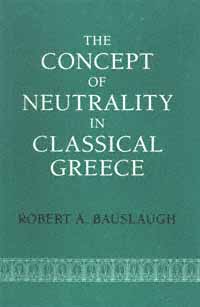 | Title: The concept of neutrality in classical Greece Author: Bauslaugh, Robert A Published: University of California Press, 1991 Subjects: Classics | Law | Classical History Publisher's Description: Looking at Classical warfare from the perspective of the non-belligerents, Robert A. Bauslaugh brings together the scattered evidence testifying to neutral behavior among the Greek city-states and their non-Greek neighbors. Were the Argives of 480/479 B.C. really "Medizers," as many have accused, or were they pursuing a justifiable policy of neutrality as they claimed? On what basis in international law or custom did the Corcyraeans claim non-alignment? Why were the leading belligerent states willing to accept the inclusion of a "neutrality clause" in the Common Peace of 371? These questions have not been asked by historians of international law, and the answers provide a far more complex and sophisticated picture of interstate relations than has so far been available.Despite the absence of exclusively diplomatic language, the concept of respect for neutrals appears early in Greek history and remains a nearly constant feature of Classical wars. The problems confronting uncommitted states, which have clear parallels in modern history, were balanced by widespread acceptance of the need for limitations on the chaos of warfare. [brief] Similar Items |
| 16. | 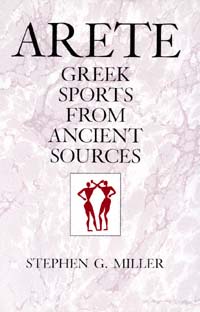 | Title: Arete: Greek sports from ancient sources Author: Miller, Stephen G Published: University of California Press, 1991 Subjects: Classics | Classical Literature and Language | History | Ancient History | Sports Publisher's Description: From the informal games of Homer's time to the highly organized contests of the Roman world, Miller has compiled a trove of ancient sources - Plutarch on boxing, Aristotle on the pentathlon, Philostratos on clay dust as an anti-perspirant and on the buying and selling of victories, Vitruvius on literary competitions, Xenophon on female body building. With fully twice as many texts as the highly successful first edition, this new version of Arete offers readers an absorbing lesson in the culture of Greek athletics from the greatest of teachers - the ancients themselves.These sources, which Miller himself has translated, provide unparalleled insights into ancient athletic practices and competitive festivals. They emphasize the fundamental role of athletics in education and shed light on such issues as the role of women in athletics and the politics and economics of the games. Ultimately they demonstrate that the concepts of virtue, skill, pride, valor, and nobility embedded in the word arete and so closely associated in the modern mind with Greek athletics are only part of the story from antiquity. [brief] Similar Items |
| 17. | 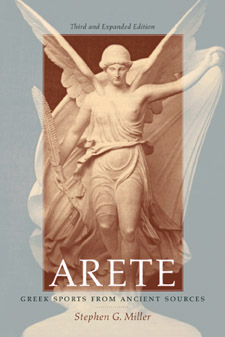 | Title: Arete: Greek sports from ancient sources Author: Miller, Stephen G. (Stephen Gaylord) 1942- Published: University of California Press, 2004 Subjects: Classics | Ancient History | Sports Publisher's Description: From the informal games of Homer's time to the highly organized contests of the Roman world, Miller has compileda trove of ancient sources: Plutarch on boxing, Aristotle on the pentathlon, Philostratos on the buying and selling of victories, Vitruvius on literary competitions, and Xenophon on female body building. With nearly 50 percent more texts than the highly successful second edition, this new version of Arete offers readers an absorbing lesson in the culture of Greek athletics from the greatest of teachers, the ancients themselves, and demonstrates that the concepts of virtue, skill, pride, valor, and nobility embedded in the word arete are only part of the story from antiquity. [brief] Similar Items |
| 18. | 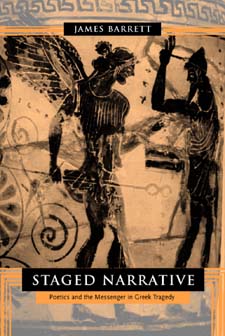 | Title: Staged narrative: poetics and the messenger in Greek tragedy Author: Barrett, James 1953- Published: University of California Press, 2002 Subjects: Classics | Classical Literature and Language Publisher's Description: The messenger who reports important action that has occurred offstage is a familiar inhabitant of Greek tragedy. A messenger informs us about the death of Jocasta and the blinding of Oedipus, the madness of Heracles, the slaughter of Aigisthos, and the death of Hippolytus, among other important events. Despite its prevalence, this conventional figure remains only little understood. Combining several critical approaches - narrative theory, genre study, and rhetorical analysis - this lucid study develops a synthetic view of the messenger of Greek tragedy, showing how this role illuminates some of the genre's most persistent concerns, especially those relating to language, knowledge, and the workings of tragic theater itself. James Barrett gives close readings of several plays including Aeschylus's Persians, Sophocles' Electra and Oedipus Tyrannus, and Euripides' Bacchae and Rhesos. He traces the literary ancestry of the tragic messenger, showing that the messenger's narrative constitutes an unexplored site of engagement with Homeric epic, and that the role illuminates fifth-century b.c. experimentation with modes of speech. Breaking new ground in the study of Athenian tragedy, Barrett deepens our understanding of many central texts and of a form of theater that highlights the fragility and limits of human knowledge, a theme explored by its use of the messenger. [brief] Similar Items |
| 19. | 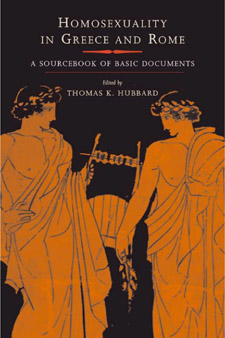 | Title: Homosexuality in Greece and Rome: a sourcebook of basic documents Author: Hubbard, Thomas K Published: University of California Press, 2003 Subjects: Gender Studies | Classics | GayLesbian and Bisexual Studies Publisher's Description: The most important primary texts on homosexuality in ancient Greece and Rome are translated into modern, explicit English and collected together for the first time in this comprehensive sourcebook. Covering an extensive period - from the earliest Greek texts in the late seventh century b.c.e. to Greco-Roman texts of the third and fourth centuries c.e. - the volume includes well-known writings by Plato, Sappho, Aeschines, Catullus, and Juvenal, as well as less well known but highly relevant and intriguing texts such as graffiti, comic fragments, magical papyri, medical treatises, and selected artistic evidence. These fluently translated texts, together with Thomas K. Hubbard's valuable introductions, clearly show that there was in fact no more consensus about homosexuality in ancient Greece and Rome than there is today. The material is organized by period and by genre, allowing readers to consider chronological developments in both Greece and Rome. Individual texts each are presented with a short introduction contextualizing them by date and, where necessary, discussing their place within a larger work. Chapter introductions discuss questions of genre and the ideological significance of the texts, while Hubbard's general introduction to the volume addresses issues such as sexual orientation in antiquity, moral judgments, class and ideology, and lesbianism. With its broad, unexpurgated, and thoroughly informed presentation, this unique anthology gives an essential perspective on homosexuality in classical antiquity. [brief] Similar Items |
| 20. | 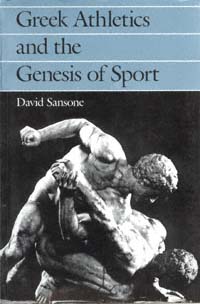 | Title: Greek athletics and the genesis of sport Author: Sansone, David Published: University of California Press, 1992 Subjects: Classics | Sports | Cultural Anthropology Publisher's Description: How is sport in contemporary society related to sport in earlier civilizations? Why is the expenditure of energy involved in sport considered exhilarating, while the equivalent expenditure of energy in other contexts can be dispiriting? David Sansone offers answers to these questions and advances a revolutionary thesis to account for the widespread phenomenon of sport. Drawing upon ethnological findings to demonstrate the ritual character of sport, he explores the relationship between ancient Greek sport and sacrificial ritual and traces elements common to both back to primitive origins. [brief] Similar Items |